If you’re looking to boost your website’s visibility in search results, EEAT (Expertise, Authoritativeness, Trustworthiness) should be at the core of your SEO strategy.
EEAT is an acronym created by Google, that stands for Experience, Expertise, Authoritativeness and Trustworthiness.
Though not classed as a ranking factor by Google, it is a component of Google’s Search Quality Evaluator Guidelines, helping to determine whether the search engine results are returning relevant and high-quality information.

Google, along with other major search engines, want to reduce low-quality content and disinformation being seen on their platforms.
Therefore, referring to the EEAT principles when building your website(s) can help guide your content to ensure it will meet Google’s standards for relevance and quality.
In this post, we’ll dive into actionable steps you can take to improve your site’s EEAT and, as a result, see your SEO performance rise. From refining your author profiles to optimizing your content’s credibility, these strategies are designed to help you get ahead of the competition.
The Core Elements of EEAT
Experience
Starting off with the first element of EEAT: Experience. For website owners, this is all about demonstrating genuine, first-hand experience.
This can range from an author personally testing a product they’re reviewing, dining at a restaurant they’re writing about, or purchasing from a store they’re evaluating. Sharing real-life experiences adds authenticity that resonates with readers.
As AI-generated content becomes more prevalent, showcasing human experiences is becoming even more critical. AI can’t replicate genuine, lived experiences, making this a key factor that sets human-written content apart in an increasingly automated web.
- Using your own first-hand photos and videos you have taken during an experience, rather than taking images from another’s site.
- Ensuring you’re sharing your own thoughts, opinions and detailed accounts in reviews.
- Including case studies from real customers or clients.
The example below from THE FOODAHOLIC, a lifestyle blog dedicated to showing firsthand experiences of luxury food, hotels and destinations, highlights a great way of how to integrate your own experiences within your online publishing’s.
As you read through the article, it’s clear to see the images are first-hand, from their own experience.
As well as mentioning some of their favorite things about their time there, demonstrating this is their own personal account from their own experience.

We love to showcase real success stories from our own customers, which is why we regularly contact customers for interviews to discuss with them their experience with us and how we may have helped their business grow and succeed.
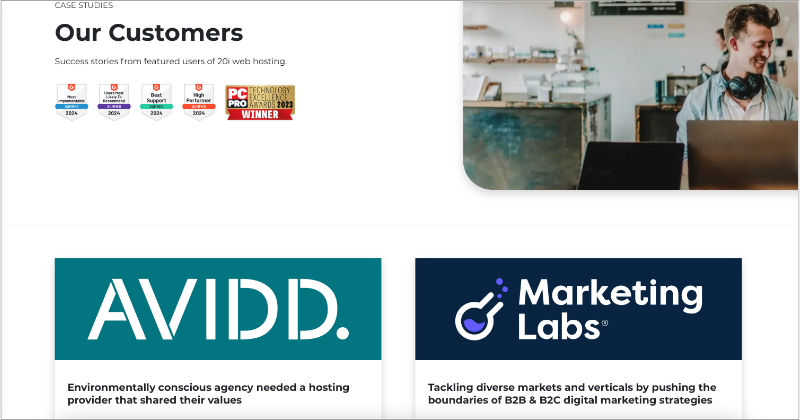
Expertise
“Expertise refers to the knowledge and skill of the content creator, whether gained through formal education, qualifications, or hands-on experience with the subject matter.
Google essentially asks, ‘Does this person have the expertise and qualifications to provide credible and reliable information?’ This is particularly important for YMYL (Your Money, Your Life) topics, such as medicine or finance, which are subject to stricter scrutiny.
However, even for less critical subjects, it’s still essential to demonstrate your expertise clearly. Staying on topic within your content is also crucial. If your site deviates too much, Google may judge your content as less relevant, which could impact your rankings. Read more about this here.
- Including an author biography. Share your qualifications, career information and background experience. Additionally, link to your LinkedIn account.
- Showcase awards you may have won.
- Create a blog full of helpful content, and real-life ‘how to do’ examples, containing your expertise within.
- Showcase other industry involvement. Such as other publications you have been featured in, speaking at conferences, appearing on podcasts and more!
- Add article schema to your blog posts, which can help improve search engines understanding of who wrote an article, boosting credibility, and potentially increasing search visibility through rich snippets.
Looking at the example below from Martin Lewis’ website, the UK’s biggest consumer help-site in money saving tips, we see a biography discussing Martins depth of experience and qualifications, indicting clearly his experience in the subject matter.

Below we’ve screenshot our website homepage to show how we showcase relevant awards we’ve won, helping to demonstrate a clear level of expertise and skill in our field.
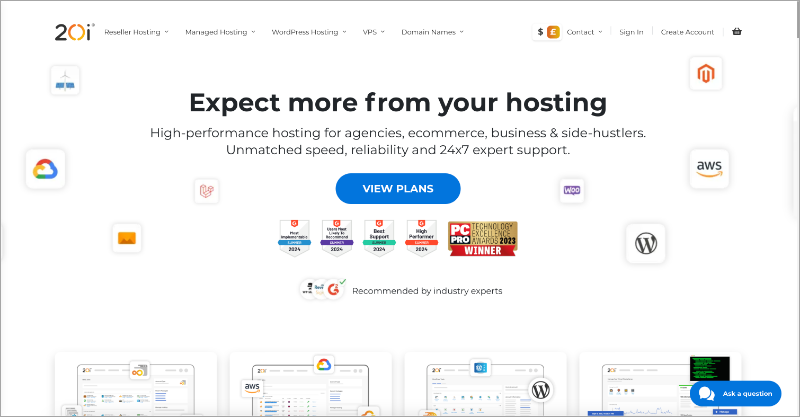
Below shows an example from Emma Duckworth Bakes. To demonstrate a level of expertise, Emma has showcased other publications she has recently been featured in on her homepage.
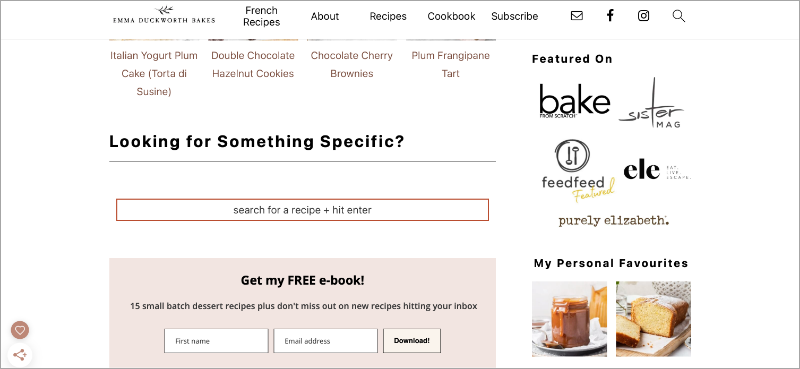
The site also displays ‘how-to guides’ to other recipes…

Authoritativeness
Authoritativeness reflects your reputation within your field and the degree to which your content is considered a trusted source of knowledge.
It’s also about being recognized by others as an expert, which is often demonstrated through backlinks—when respected third-party websites reference your content.
The more high-quality, relevant backlinks you have, the more likely Google is to view your site as authoritative, which can positively influence your rankings.
- Building a strong content base, covering all areas of your topic.
- Citing from other relevant and authoritative, sites showing your information is backed up by credible sources.
- Partnering with notable names in your industry, through hosting them on podcasts or interviewing them for an article to gain insight.
Mob, the popular online site for food recipes, shares a dynamic mix of content within their articles.
Ranging from tips and kitchen hacks to ‘green’ articles that promote more sustainable cooking, as well as interviews with well-known guests.
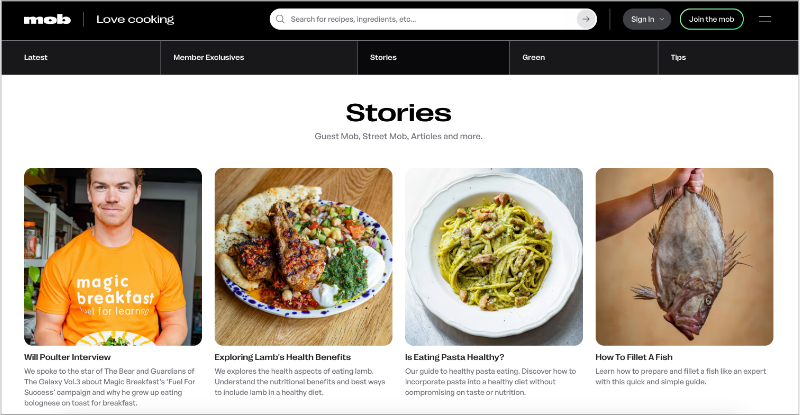
To support their written content, WebMD frequently includes links to external, reputable sources on their news page, helping Google to see this as credible material.
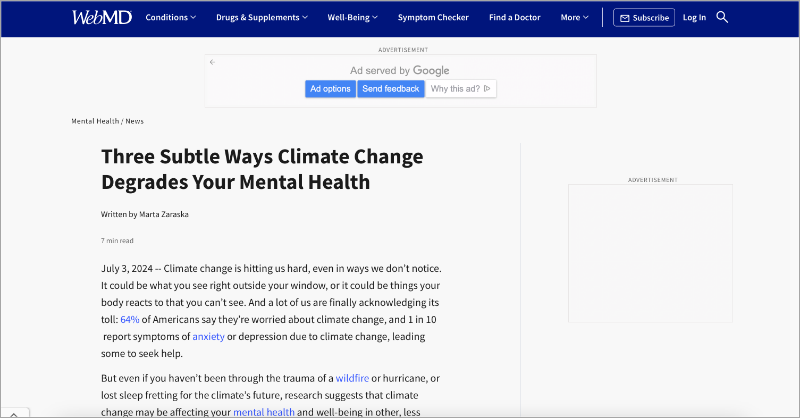
Click the link here to see how well regarded your current backlinks are. The higher you rank out of 100, the better and stronger your backlink profile is.
WIRED, the popular tech magazine, published an article discussing the role of AI within the video game industry. I’ve highlighted a key point where they interviewed Voilet and expressed clearly her role and her qualifications in the field being discussed, showing a level of reliability.
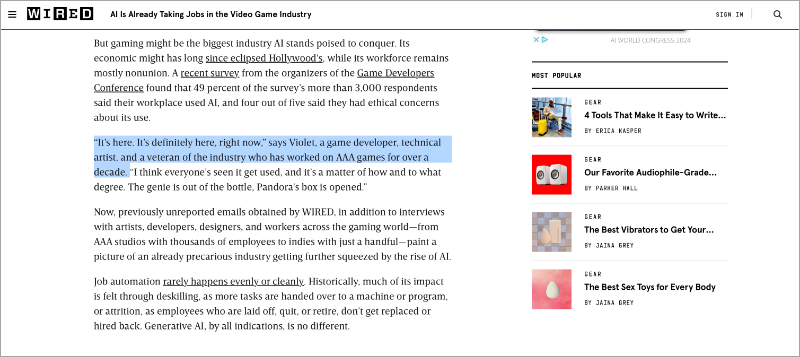
Trustworthiness
Finally, at the center of the EATT framework is trustworthiness, with google citing this being the most important metric of them all.

They explain, ‘Trust is the most important member of the EEAT family because untrustworthy pages have low EEAT no matter how Experienced, Expert, or Authoritative they may seem.’
You can increase your trustworthiness in the eyes of Google if they consider your site accurate, honest, safe and reliable.
- Ensuring the information you’re pushing across is true and factually accurate.
- Making it easy for website visitors to contact you, ensuring your contact information is clear and accessible.
- Displaying or linking to customer reviews. It’s important to be honest and show both good and bad feedback as well as being responsive.
- Linking your socials. Showing you have an active fan or customer base that you regularly interact and engage with.
- Making sure any shipping and returns policies are easy to find and accurate.
- Ensuring your website’s security is strong and up to date. (Make sure your site uses SSL encryption or HTTPS).
Bijoux De Mimi, a small jewellery brand, display ‘Contact’ within their homepage.

Within 2 clicks, you’re taken straight to a contact’s page covering everything from customer service, shipping & returns information, PR, wholesale and careers.
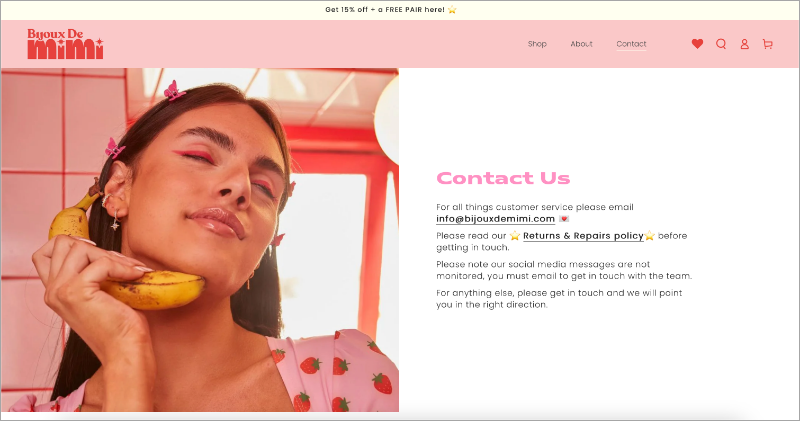
Department store Liberty links all their socials at the bottom of each of their web pages to which they regularly engage and connect with their customer base.

Below shows how easy and simple it is to access Luxury reseller Vestiaire Collective’s return information.
From simply typing the brand name and ‘returns’ into Google, the returns policy pops up with all the details a customer may need, with the addition of a ‘Contact Us’ page.

Summary
While EEAT may not be a direct ranking factor, it plays a crucial role in how Google assesses the quality and relevance of your content.
By focusing on the principles of Experience, Expertise, Authoritativeness, and Trustworthiness, you can create content that not only ranks well but also resonates with users.
Building credibility through real-life experiences, showcasing your knowledge, gaining reputable backlinks, and ensuring trustworthiness are key steps to improving your SEO performance.
As you continue to refine and align your website with these principles, you’ll be well-positioned to meet Google’s evolving standards and achieve long-term success in search rankings.








Add comment